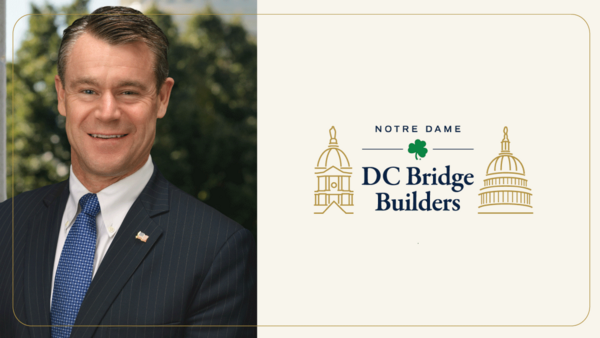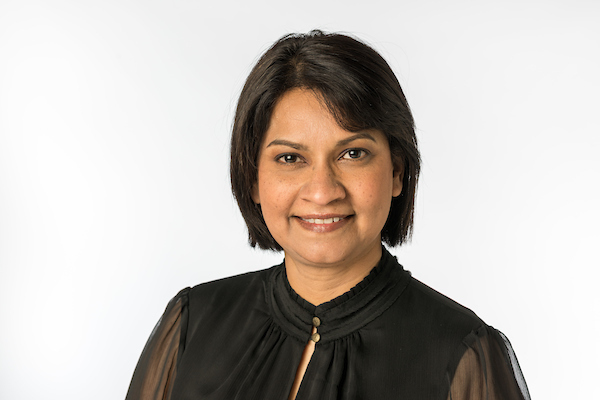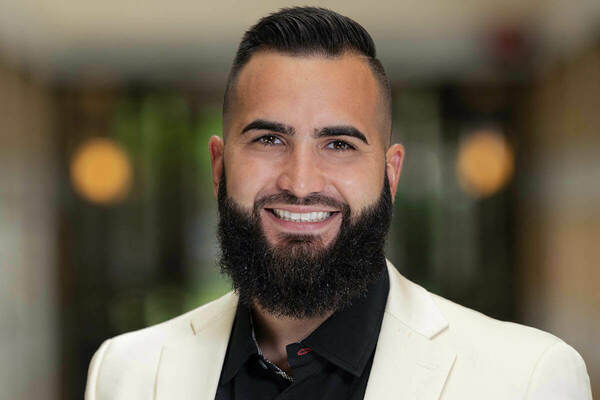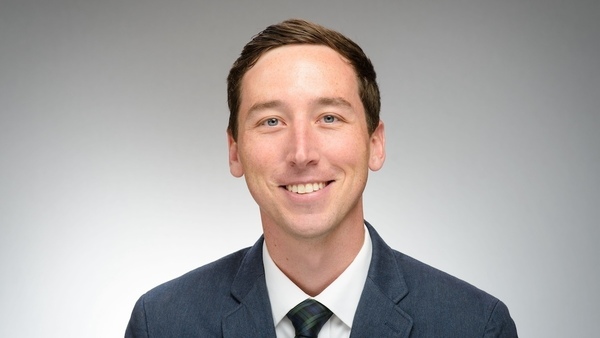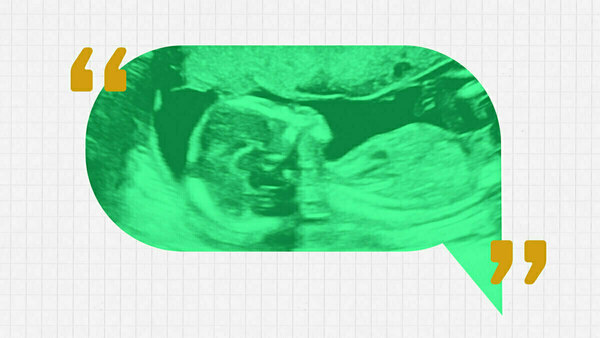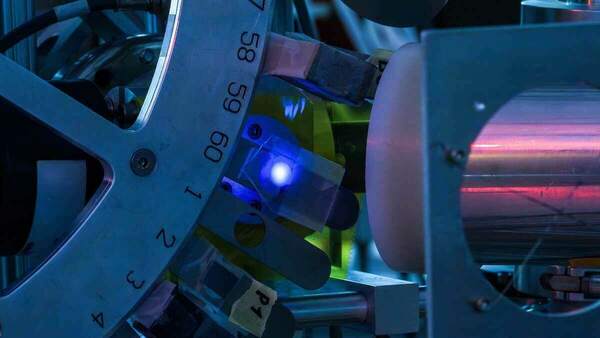U.S. Senator Todd Young on bridge-building in Congress and Notre Dame’s role in strengthening civil discourse
Inspired by University President Rev. Robert Dowd, C.S.C. 's call for Notre Dame to embrace its collective responsibility as “bridge-builders” to a new era, the Washington Office is highlighting members of the Notre Dame community who are finding common ground and making an impact in government, policymaking, public service, and beyond.
For this installment of DC Bridge Builders, we’re spotlighting Senator Todd Young (R-IN) who is known for effectively working across the aisle and forging bipartisan partnerships to get meaningful legislation passed in Congress. Senator Young has served in the Senate since 2017 and previously represented Indiana’s 9th Congressional District in the U.S. House. Prior to joining Congress, he served nearly a decade in the U.S. military.
Watch the video below to hear Senator Young’s perspective on bridge-building and the role universities like Notre Dame play in advancing the common good:
Building Bridges in the U.S. Senate
For Senator Young, bridge building means identifying gaps – and working with others to close them through trust, dialogue, and principled compromise.
“A hallmark of a bridge builder is always looking for opportunities to encourage others to engage in dispassionate conversations,” he says. He has prioritized these opportunities while in elected office, facilitating conversations between opposing factions on policy issues to promote common understanding.
“I tried something unconventional, which was sitting down with people from both sides of the issue and encouraging them to engage in respectful dialogue while I served as a moderator,” Senator Young said. “I’ve enjoyed doing that. I think it’s really important that we continue to communicate with one another, even when we have very strong feelings and are unlikely to come to an agreement.”
This commitment to building bridges has made Senator Young a key leader in forging consensus, both within his own political party and across the aisle. “I’ve enjoyed playing that role,” he says. “I’ve been tasked by the Majority Leader with visiting with colleagues to help us achieve a sufficient number of votes to pursue a shared objective. I’ve also been tasked with approaching Members of the other side of the aisle, including their leadership, to help the parties reach common ground.”
The work is not only an essential part of the political process, but also beneficial to the communities they represent. In Congress, there is “rarely an opportunity to solve a problem without building a bridge,” Senator Young says. “Bridge building is designed to enable both parties and the broader community of stakeholders to realize an improvement in their lives. I cannot conceive of a meaningful policy issue that was not sustainably solved or improved without building bridges.”
Notre Dame’s Role in Cultivating Bridge Builders and Strengthening Civil Discourse
In the halls of Congress and across our country, the process of bridge-building is essential and urgent. According to Senator Young, universities are uniquely positioned to develop future bridge-builders by encouraging critical thinking and building skills students need to engage meaningfully across divides.
“Education is not designed to make us feel comfortable; in fact, oftentimes the opposite – it’s supposed to take us outside of our comfort zone, so that we can recognize greater truths than the ones we hold,” he says. “I do think the University of Notre Dame still carries that torch – inviting in different perspectives, which leads to clearer thinking and more bridge-building.”
Driven by its faith-based mission, Notre Dame seeks to cultivate both students’ moral character and intellectual development, a comprehensive liberal arts education that Senator Young says makes Notre Dame unique: “There aren’t many institutions today that are comfortable leaning into that framework for education and then, the service that the education will prepare [students] to engage in. I think a Notre Dame education and Notre Dame people – graduates and others in the community – can play a very important role in terms of drawing on the strength of their moral character and their moral vision to make a real impact,” he says. “I think there’s a hunger for that right now. We don’t see it in every realm.”
Universities like Notre Dame have a critical role to play in strengthening civil discourse, Senator Young concludes. “Universities can teach how to think objectively, how to argue respectfully, and how to instill an ethic of service into daily life. Everyone – and certainly every graduate at the University of Notre Dame – should understand that they have the ability to serve in very important ways, as well as a certain responsibility to serve others.”
DC Bridge Builders spotlights members of the Notre Dame community who are fostering collaboration and common purpose in our nation’s capital.
Know someone building bridges in DC? Nominate them here.
Originally published by at washingtonoffice.nd.edu on July 23, 2025.
Latest Research
- Women of African ancestry may be biologically predisposed to early onset or aggressive breast cancersResearch from the University of Notre Dame is shedding light on why Black women are likely to have early-onset or more aggressive subtypes of breast cancer. The study published in iScience found that a population of cells in breast tissues, dubbed PZP cells, send cues that prompt behavioral changes that could promote breast cancer growth.
- Doctoral student Joryán Hernández to receive inaugural Sr. Dianna Ortiz, OSU Peacemaker AwardJoryán Hernández, a peace studies and theology doctoral student at the University of Notre Dame, was tapped as the first-ever recipient of the Sr. Dianna Ortiz, OSU Peacemaker Award from Pax…
- The Institute for Educational Initiatives at Notre Dame Launches Free Math App to Help Teachers Strengthen Students’ Understanding of Numbers and OperationsThe Number Sense Assessment app gives educators quick, research-based insights to target instruction and improve student outcomes Notre Dame, IN — Researchers at the Institute for Educational Initiatives at the University of Notre Dame have launched…
- Notre Dame researchers to shed light on the Brazilian Amazon, conflict resolution, microplastics, and moreNotre Dame Research (NDR) has selected five awardees of the Research and Scholarship Program – Regular Grant (RSP-RG) and five awardees of the Research…
- First impressions count: How babies are talked about during ultrasounds impacts parent perceptions, caregiving relationshipPsychologist Kaylin Hill studied the impact of a parent’s first impression of their baby during an ultrasound exam. The words used by the medical professional to describe the baby (positive or negative) influence how the parents perceive their baby, relate to them after they're born and even how that child behaves as a toddler. The research has broad implications for how we train medical professionals to interact with expectant parents, as well as how we care for parents during the perinatal period when they are most susceptible to depression.
- Researchers at Notre Dame detect ‘forever chemicals’ in reusable feminine hygiene productsWhen a reporter with the Sierra Club magazine asked Graham Peaslee, a physicist at the University of Notre Dame, to test several different samples of unused menstrual underwear for per- and polyfluoroalkyl substances (PFAS) in 2019, the results fueled concern over chemical exposure in feminine hygiene products — which ultimately ended up in a $5 million lawsuit against the period and incontinence underwear brand Thinx. Then in 2023, the New York Times asked Peaslee to test 44 additional period and incontinence products for PFAS, a class of toxic fluorinated compounds inherently repellent to oil, water, soil and stains, and known as “forever chemicals” for their exceptionally strong chemical and thermal stability. Measurable PFAS were found in some layers of many of the products tested — some low enough to suggest the chemicals may have transferred off packaging materials, while others contained higher concentrations, suggesting the chemicals were intentionally used during the manufacturing process. In the meantime, another group of researchers published a study that found PFAS in single-use period products, leading Peaslee and his lab to widen their investigation into all sorts of reusable feminine hygiene products — often viewed as an eco-friendly option by consumers. Now, the results of that study have been published in Environmental Science & Technology Letters.



